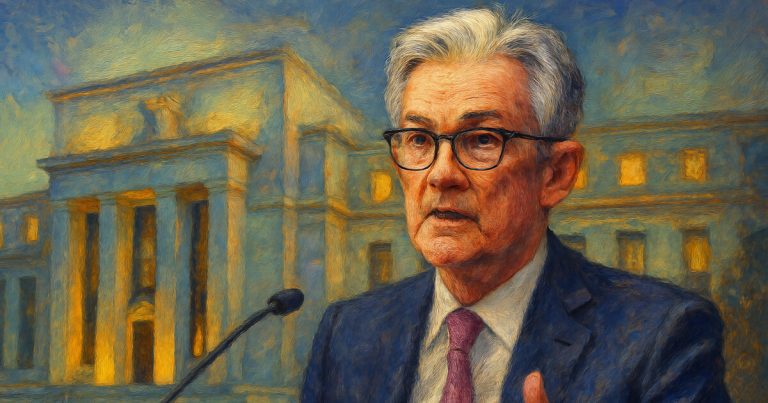Federal Reserve Chairman Jerome Powell warned on April 4 that President Donald Trump’s newly announced tariffs could likely boost inflation and slow economic growth.
However, he also showed that the central bank would refrain from moving interest rates until the effectiveness becomes more clear.
According to Powell:
“It will soon be a suitable path for monetary policy.”
Speaking at a business journalism event in Arlington, Powell said the Fed faces “very uncertain outlook” following the administration’s decision to impose 10% tariffs and a sudden retaliation obligation on several major trading partners.
Powell added that the Fed is ready to be patient when assessing fallout. He said:
“Our duty is to fully secure long-term inflation expectations and ensure that one-time price levels rise does not become an ongoing inflation problem.”
Comments cited an increase in economic uncertainty that occurred several weeks after the central bank changed its benchmark interest rate from 4.25% to 4.50%.
Powell’s remarks suggest that the Fed is in a hurry to change its policy stance, despite financial markets increasingly anticipating interest rate cuts starting this summer.
Market futures show that market futures are growing expectations that the Fed will fall at least 1 percentage point by the end of the year. However, Powell emphasized that such expectations could be premature, especially if inflation risks begin to rise again.
While Powell acknowledged that unemployment rates remain “a good place” with low steady demand, Powell flagged consumer concerns about inflation, noting that core inflation, which runs at 2.8% per year as of February, exceeds the Fed’s 2% target.
Trump has publicly urged the Fed to cut fees and accused Powell of failing to respond to the decline in inflation. However, Powell rejected political pressure and repeated the Fed’s independence and double duty: price stability and maximum employment.
“Taxes are likely to generate at least temporary increases inflation, but the impact could also be more sustained. The outcome could depend on fully fixing long-term inflation expectations.”
Several countries have already announced retaliatory tariffs in response to the White House moves, further complicating the outlook for global trade and US inflation.
Powell said the full extent of economic impact remains uncertain, especially during the time it takes to new pricing pressures to ripple through the supply chain.
Meanwhile, Bitcoin (BTC) has largely responded to Powell’s remarks, trading for over $83,000, and has maintained its recent strength amid the broader market volatility of risky assets.
The Fed’s next policy decision is scheduled for early May, but Powell did not show that the shift was imminent.
When reporting 6:16pm, UTC on April 4, 2025Bitcoin ranks number one in terms of market capitalization, and prices are rising 1.6% Over the past 24 hours. Bitcoin’s market capitalization is $1.65 trillion, with 24-hour trading volume of $443.2 billion. Learn more about Bitcoin›
When reporting 6:16pm, UTC on April 4, 2025the Crypto market totals $2.66 trillion, with a 24-hour volume of $102.95 billion. Bitcoin’s advantage is currently 61.94%. Crypto Market Details›
It is mentioned in this article






